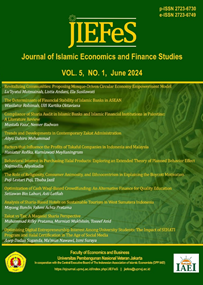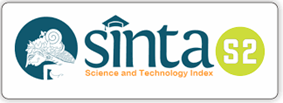Analysis of Sharia-Based Hotels on Sustainable Tourism in West Sumatera Indonesia
DOI:
https://doi.org/10.47700/jiefes.v5i1.7378Keywords:
Sharia-based Hotel, Sustainability, TourismAbstract
Tourism is a potential sector in the world, especially halal tourism which is a potential market for Muslim tourists, especially Indonesia, and more specifically West Sumatera. Because this province has the potential for halal tourism because it is included in the halal destinations listed in the 2015/2025 National Tourism Development Master Plan (Rencana Induk Pembangunan Kepariwisataan Nasional/Ripparnas). Furthermore, one of the sub-subs of halal tourism is sharia-based hotels which support tourists to stay overnight. Then, in tourism theory there is the term sustainable tourism, tourism that has an effect on economic, environmental and social aspects. The aim of this research is to scientifically determine the influence of Sharia-based hotels on sustainable tourism development in West Sumatera. This research is combination research that used mixed method. Quantitative method using questionnaires and also qualitative using analytical descriptive. The research results show that Sharia-Based Hotels have a positive influence on Sustainable Tourism in West Sumatera, including economic, environmental and social aspects. The increase in Sharia-Based Hotels is directly proportional to the increase in Sustainable Tourism.
References
Al Mustaqim, D. (2023). Strategi Pengembangan Pariwisata Halal Sebagai Pendorong Ekonomi Berkelanjutan Berbasis Maqashid Syariah. AB-JOIEC: Al-Bahjah Journal of Islamic Economics, 1(1), 26–43. https://doi.org/10.61553/abjoiec.v1i1.20
Anggraini, R. S. (2016). Kerjasama Indonesia - United Nations World Tourism Organization (UNWTO) dalam upaya mengembangkan Pariwisata Hijau melalui Sustainable Tourism Through Energy Efficiency With Adaptation And Mitigation Measures (STREAM) di Pangandaran. Perpustakaan Pusat Unikom.
Ardiwidjaja, R. (2018). Arkeowisata: Mengembangkan daya tarik pelestarian warisan budaya. Deepublish.
Arief, S. (2018). Pembangunan Pariwisata Berkelanjutan Dalam Perspektif Sosial Ekonomi. Jurnal Planoearth, 3(1), 7–11. https://journal.ummat.ac.id/index.php/JPE/article/view/213/0
Basalamah, A. (2011). Hadirnya Kemasan Syariah dalam Bisnis Perhotelan di Tanah Air. Binus Business Review, 2(2), 763. https://doi.org/10.21512/bbr.v2i2.1222
Chaerodin. (2018). Penerapan Hotel Berbasis Syariah Dalam Menekan Perilaku Disasosiatif Masyarakat Melalui Pemenuhan Syariah Compliance Di Sofyan Inn Hotel Unisi Yogyakarta. Universitas Islam Indonesia.
Eta, E. (2023). Arahan Pengembangan Desa Wisata Konservasi Edelweis Berbasis Sustainable Tourism Di Desa Wonokitri Kecamatan Tosari Kabupaten Pasuruan. Institut Teknologi Nasional (ITN) Malang.
Feizollah, A., Mostafa, M. M., Sulaiman, A., Zakaria, Z., & Firdaus, A. (2021). Exploring halal tourism tweets on social media. Journal of Big Data, 8(1). https://doi.org/10.1186/s40537-021-00463-5
Henderson, J. C. (2010). Sharia-Compliant Hotels. Tourism and Hospitality Research, 10(3), 246–254. https://doi.org/10.1057/thr.2010.3
Hidayati, N. (2017). MAKNA RIHLAH DAN SAFAR DALAM AL-QUR’AN STUDI PENAFSIRAN IBNU KAṠIR DAN M. QURAISH SHIHAB. UIN SUNAN KALIJAGA YOGYAKARTA.
Imam Ghozali. (2012). Aplikasi Analisis Multivariate dengan Program IBM SPSS 20 Edisi 6. Badan Penerbit Universitas Diponegoro.
Jannah, N. M., & Sari Rudiwati. (2019). Pengembangan Modul Pembelajaran Keterampilan Menulis Berbasis Self-Regulated Strategy Development untuk Anak Autis di Sekolah Khusus. Universitas Negeri Yogyakarta.
Joeliaty, J., Ahmad Faisal, Y., & Wendra, W. (2020). An Analysis of Strategy Formulationfor Halal Hotel Human Resources in Indonesia. Cogent Business and Management, 7(1). https://doi.org/10.1080/23311975.2020.1842008
Jurattanasan, A., & Jaroenwisan, K. (2014). The attribution of shariah compliant hotel in Muslim countries. Review of Integrative Business and Economics Research, 3, 39.
Kemenparekraf. (2022). Rencana Strategis Perubahan Kementerian Pariwisata & Ekonomi Kreatif dan Badan Pariwisata & Ekonomi Kreatif.
Mabrurin, A., & Latifah, N. A. (2021). Analisis Pengembangan Potensi Pariwisata Syariah Dalam Meningkatkan Perekonomian Masyarakat. Journal of Islamic Tourism, Halal Food, Islamic Traveling, and Creative Economy, 1(1), 63–88. https://doi.org/10.21274/ar-rehla.2021.1.1.63-88
Masterplan Ekonomi Syariah Indonesia 2019-2024. (2018). Masterplan Ekonomi Syariah Indonesia 2019-2024. Kementerian Perencanaan Pembangunan Nasional/ Badan Perencanaan Pembangunan Nasional, 1–443.
Noviantoro, K. M., & Zurohman, A. (2020). Prospek pariwisata syariah (Halal Tourism): Sebuah tantangan di era revolusi industri 4.0. Equilibrium: Jurnal Ekonomi Syariah, 8(2), 275–296.
Purwanto. (2012). Metodologi Penelitian Kuantitatif: untuk psikologi dan pendidikan. Pustaka Pelajar.
Rachmiatie, A., Fitria, R., Suryadi, K., & Ceha, R. (2020). Strategi komunikasi pariwisata halal studi kasus implementasi halal hotel di Indonesia dan Thailand. Amwaluna: Jurnal Ekonomi Dan Keuangan Syariah, 4(1), 56–74.
Saputram, N. H., Kholisiah, L., & Nuraini, E. (2018). Potensi Prospek Wisata dalam Meningkatkan Ekonomi Daerah (Studi Kasus : Kota Bandung). Journal of Business and Entrepreneurship, 1(2), 93–103.
Subagyo, H. (2019). The effect of destination brand awareness on destination brand loyalty through brand image, perceived brand quality, brand value and brand satisfaction in banyuwangi city as a tourism objective. Untag 1945 Surabaya.
Suci, A., Junaidi, Nanda, S. T., Kadaryanto, B., & van FC, L. L. (2021). Muslim-friendly assessment tool for hotel: how halal will you serve? Journal of Hospitality Marketing and Management, 30(2), 201–241. https://doi.org/10.1080/19368623.2020.1775746
Sugiyono. (2019a). Metode Penelitian kuantitatif kualitatif dan R&D (2019th ed.). Alfabeta.
Sugiyono. (2019b). Statistika Untuk Penelitian. CV Alfabeta.
Sulistyadi, Y., Eddyono, F., & Entas, D. (2019). Indikator Perencanaan Pengembangan Pariwisata Berkelanjutan.
Downloads
Published
Issue
Section
License
Copyright (c) 2024 Mayang Bundo, Fahmi Achta Pratama

This work is licensed under a Creative Commons Attribution 4.0 International License.
Authors who publish with this journal agree to the following terms:
- Authors retain copyright and grant the journal right of first publication with the work simultaneously licensed under a Creative Commons Attribution 4.0 International License that allows others to share the work with an acknowledgment of the work's authorship and initial publication in this journal.
- Authors can enter into separate, additional contractual arrangements for the non-exclusive distribution of the journal's published version of the work (e.g., post it to an institutional repository or publish it in a book), with an acknowledgment of its initial publication in this journal.
- Authors are permitted and encouraged to post their work online (e.g., in institutional repositories or on their website) before and during the submission process, as it can lead to productive exchanges, as well as earlier and greater citation of published work.

This work is licensed under a Creative Commons Attribution 4.0 International License.











